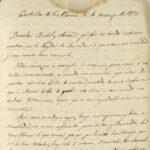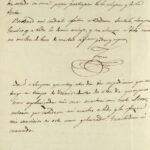- Transcription
- Description
- Notes
We have respected the spelling and grammar for each transcription, without modification or modernization. Abbreviations are transcribed as follows: “pa: para”, etc.
Spanish Transcription
Castellon de la Plana 14 de marzo de 1873
Queridas Isabel y Aurea: por fin he tenido noticias vuestras con la llegada de Fernando. Sé que estais sin novedad y me siento mas tranquilo.
Podeis comenzar á arreglar lo necesario para venir, si no hallais inconveniente, y cuando me anunciéis que estais dispuestas señalaré el dia de vuestra partida de esa. Confio en que á Mamá le ha de probar este clima y aun cuando no tendreis distracciones, espero que os será agradable estar en mi compañia.
Aqui, como os indiqué ayer, tengo casa espaciosa y bien amueblada, con camas suficientes para los tres y Fernando; la ropa blanca sí que escasea por que por lo visto hace tiempo que no la han rehecho; hay solo 6 sabanas, 2 manteles, dos servilletas y dos toallas. Las sábanas nos bastarán, pero debereis subir un par de manteles, algunas servilletas y toallas de casa. Todo lo demas nos bastará. Lo que he de advertiros <es> que aqui no se encuentra muger alguna para servicio ni cocinera. Tengo un criado-ordenanza, pero este no servirá para la compra ni para el guiso, ni para peinaros ni vestiros. Quizás convendria traeros una de por allí. Pensadlo bien y decidmelo cuando escribais
[1v] Estoy muy ocupado y no puedo estenderme mucho.
Ya sé que los dias de Aurea fueron para mi querida Titeta un cúmulo de felicidades. Me alegro mucho y solo siento no haber estado en casa para participar de la alegria y de la fiesta.
Reiterad mis cordiales afectos a Badrena, Santaló, Sanpons Eusebio y a todos los demas amigos, y con abrazos a Titó recibid un millon de besos de vuestro afectisimo padre y esposo
Jose
Decid a Sanpons que estoy estos dias tan ocupadísimo que no tengo ni tiempo de dormir. Dentro dos o tres dias que espero tener regularizadas mis cosas escribiré una carta al coro; interin que salude en mi nombre a todos y les ofrezca mis servicios en esta como gobernador. Escribidme á menudo.
Description
The day after his arrival in Castelló de la Plana, Clavé writes to his wife and daughter to talk about their arrival.
The most interesting part of the letter is the brief description of the house in which he lives. He enumerates what he has at his disposal and what is necessary that his family brings from Barcelona. It is fascinating to read about the fact that Clavé cannot find domestic servants to care for his clothes or to buy and prepare food. He advises his wife and daughter to bring a maid from Barcelona.
Clavé mentions “los dias de Aurea” but he does not refer to her birthday, since it is on September 29.
At the end of the letter, he asks that Francesc Sanpons, chorist of the Euterpe, write to all chorists as soon as he can. He mentions that he is so busy that he cannot sleep and will send a letter to the chorists later.
Important data about Clavé and his family
In his letter, Clavé employs another nickname for his daughter Àurea: “Titeta” (sometimes he also uses “Titona”). It is probably due to Titó being her godfather.


